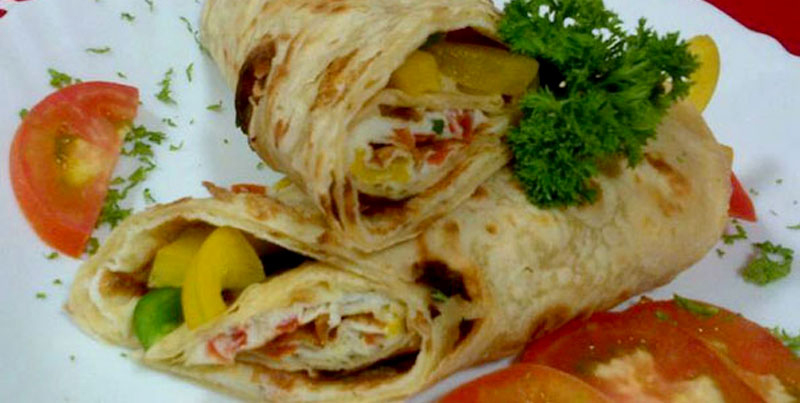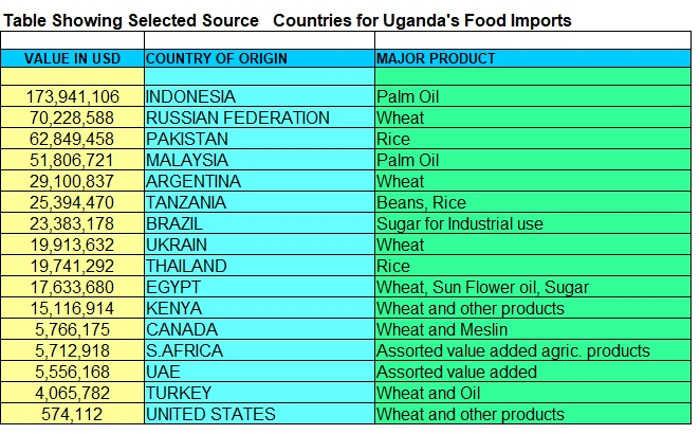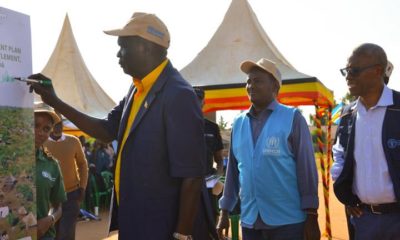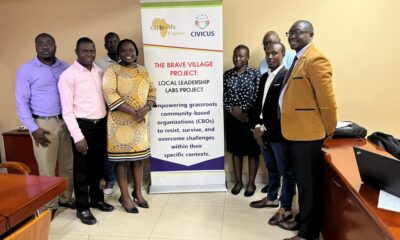News
The ‘Shameful’ Trend of Uganda Importing food

The Rolex, is probably the most popular snack in Uganda. It is made largely from wheat imported from Russia, Argentina, Turkey, Ukrain and other countries.
We Spend More Money on Foreign Food Than We Earn From Ours Abroad
Uganda has been baptised as the food basket of the region, a country gifted by nature and also a country whose economic advantage lies in agriculture. However, Uganda’s trade data on food obtained from the Uganda Bureau of Statistics, (UBOS) greatly betrays those statements that Uganda profits from the perceived edge over its neighbours in agriculture especially through production.
The Sunrise has exclusively found that Uganda spends more money to pay for food items imported into the country compared to what she earns from exporting food.
According to data provided on request by the Uganda Bureau of Statistics, (UBOS), Uganda consistently earned less money from food exports in two recent years 2016/17 and 2017/18 compared to what she spent on food imports.
The data shows that Uganda spent US$591 million (About UGX2.158 trillion) on food imports in 2017/18 financial year, compared to US$538 she earned from the food exports.
During the previous year, 2016/17, a similar trend held where the country earned just US$442M from food exports compared to US$586M that was spent on food imports.
During the two financial years, palm oil ranked as the most important food import followed by wheat and sugar.

Is Uganda involuntarily donating money to already rich countries by buying their food?
NOTE: This list is not exhaustive.
The findings cast a dark shadow on Uganda’s agricultural sector in the sense that the country has not taken advantage of its abundant natural resources such as the favourable climate, abundant water and vast arable land to bring in foreign exchange.
Our findings reveal that Wheat, Palm oil, Sugar and Rice constitute the bulk of our food imports. Developed countries like Russia, Argentina, Malaysia, Indonesia, Turkey are major recipients of Uganda’s scarce foreign exchange. But others like Egypt, Tanzania, Pakistan and Brazil are also key beneficiaries of Uganda’s failure to capitalise on its advantages to produce food locally and save the dollars.
Uganda’s deficit position in food trade partly arises from the low levels of agricultural industrialisation that ensures that most of the food exports are unprocessed and therefore bring in relatively low revenue compared to what it imports.
Many people find the growing dependence on imported food, simply abhorrent and shameful while others have observed that it is little surprising considering the state of Uganda’s agriculture.
Peter Wamboga Mugirya, The Director of Communications at the Science Livelihoods and Development (SCIFODE) expressed shock that Uganda, with its vast natural resources has descended into a food-import dependent country.
He said: “It is unbelievable and unacceptable, for a country so endowed with vast natural resources and abundant human resources, to spend more of its scarce foreign exchange on importing food, instead of producing plenty of it and feeding the region and Africa at large.
Wamboga argues that: “It takes a lot of visionary leadership and a civically alert society to institute radical steps to hate the bad socio-economic situation we currently find ourselves in. Comparatively, countries less endowed with natural resources, turn to their human resources to innovate and develop. The old dictum of squeezing water from a rock, is what lesser-endowed societies like Egypt have done and they are instead exporting food and other agriculture-derived products to us.”
Other analysts argue that the country’s failure to realise sufficient food not only to feed her people but also get surplus to export, is rooted in the subsistence nature of agricultural production that is characterised with low-yielding seeds, low levels of fertilizer application, poor storage, poor husbandry that altogether conspire to result into low levels of output hence the limited foreign exchange returns.
Clet Wandui Masiga, the Director of Tropical Institute of Development Innovations (TRIDI), argues that Ugandans must wake up to the reality that the business-as-usual attitude prevalent among Uganda’s political leadership and the wider Ugandan society, is not sustainable and threatens to endanger the country’s food security.
“We must abandon the pretence that we can make a decent living from agriculture under the prevailing conditions. In fact our farmers are the ones who are subsidizing agriculture. The day Ugandan farmers will start to keep records is the day the country will realise the dangers of neglecting farming,” observed Masiga.
Masiga argues that Uganda is not making use of proven technologies in crop improvement such as Genetic Engineering, mechanization and irrigation, which technologies have helped other countries to increase their output and exports.
“We are not taking advantage of technology. The hand hoe can only help you achieve so much. Two years ago, Ugandan farmers made losses worth more than UGX500 billion due to the fall army worm pest [that attacked maize]. Taxpayers lost an extra UGX50 billion in buying ‘Rocket’ (a pesticide) to kill the pest that ravaged maize farms.”
“This would have been avoided if we had adopted the Genetically Engineered Water Efficient Maize for Africa (WEMA maize) that is fall army worm and drought tolerant,” argues Masiga.
The African Development Bank, (AfDB) under the leadership of Nigeria’s former agriculture minister Dr. Akinwumi Adesina has implored African leaders to reverse the continent’s US$ 35 billion food import bill. He has argued that food import bill is an unacceptable foreign exchange leakage, and leads to loss of valuable resources that would have been invested into other wealth creating sectors of the economies.
Under his leadership, Dr. Adesina is championing agricultural reforms that focus on use of modern technologies to boost output, as well as building value chains that would enable industrialists substitute imported agricultural products with available alternatives.
In Nigeria, for example, the government introduced a law that ensures that all bread produced has a proportion of cassava flour as a substitute or supplement for wheat. Indeed, the country has adopted a number of modern technologies that have improved the country’s food security.
Wheat, one of the biggest drains on Uganda’s foreign exchange resources, has increased in importance in recent years, thanks in large part to its numerous uses in the fast food industry, but also because due to urbanisation.
Experts like Masiga argue that Cassava would be a very good substitute for wheat as well as sugar for both food but also as an industrial raw material. Sadly however, its production is facing numerous challenges especially diseases that hamper chances of making it an important export that it potentially can be.
Comments



























